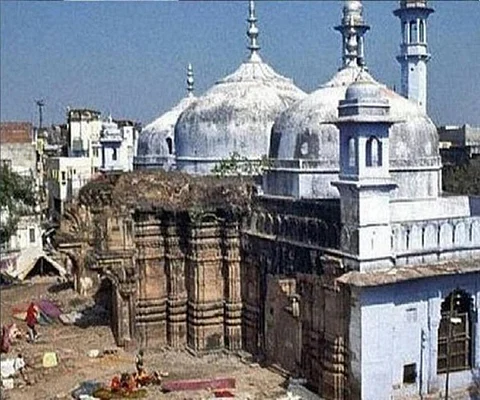

The Archaeological Survey of India (ASI) has released its scientific survey report on the Gyanvapi mosque, which says that there was a Hindu temple at the site before the construction of the mosque. According to the brief findings report released by Bar and Bench, the pre-existing structure was demolished during the 17th century under the rule of Mughal emperor Aurangzeb, with part of it repurposed in the construction of the existing mosque.
"The pre-existing structure appears to have been destroyed in the 17th century, during the reign of Aurangzeb, and part of it was modified and reused in the existing structure. Based on scientific studies/surveys carried out, study of architectural remains, exposed features and artefacts, inscriptions, art and sculptures, it can be said that there existed a Hindu temple prior to the construction of the existing structure," the report said.
The ASI's report says the findings are based on scientific studies, architectural remains, exposed features, artefacts, inscriptions, and sculptures. The report adds that sculptures of Hindu deities and carved architectural remains were found buried beneath the mosque premises.
The survey, initiated following a court order from the Varanasi district court during hearings on suits filed by Hindu parties, aimed to settle the longstanding dispute over the historical origins of the site. The court ordered the ASI to conduct a scientific survey, excluding specific areas sealed by the Supreme Court.
Among the significant findings are 34 inscriptions recorded during the survey, including those in Devanagari, Grantha, Telugu, and Kannada scripts. “These are, in fact, inscriptions on the stones of the pre-existing Hindu temples, which have been re-used during the construction/ repair of the existing structure. They include inscriptions in Devanagari, Grantha, Telugu and Kannada scripts,” the ASI said.
The inscriptions mention the names of deities such as Janardhana, Rudra, and Uměśvara. The report also highlights a stone with an inscription recovered from a room in the mosque, where lines related to the construction and expansion of the mosque were scratched out.
The report also mentions the discovery of Hindu deities' sculptures buried under soil in a cellar. Various architectural remains, including decorative mouldings, a decorated entrance gate, and carvings of birds and animals, indicate that the western wall of the existing structure likely remains a part of the original Hindu temple, it said.
In August 2023, the Allahabad High Court permitted a scientific survey of the Gyanvapi Masjid, dismissing a petition by the mosque committee. The Varanasi district judge had earlier ordered the Archaeological Survey of India (ASI) to conduct a survey, excluding Supreme Court-sealed areas. The ASI submitted its report on December 18.
The recent suit filed by Hindu women seeks year-round access for darshan and pooja of Maa Shringar Gauri in the Gyanvapi Masjid compound. The High Court directed the ASI to submit its scientific survey report to the court, and if further survey is needed, the lower court will issue necessary directions.